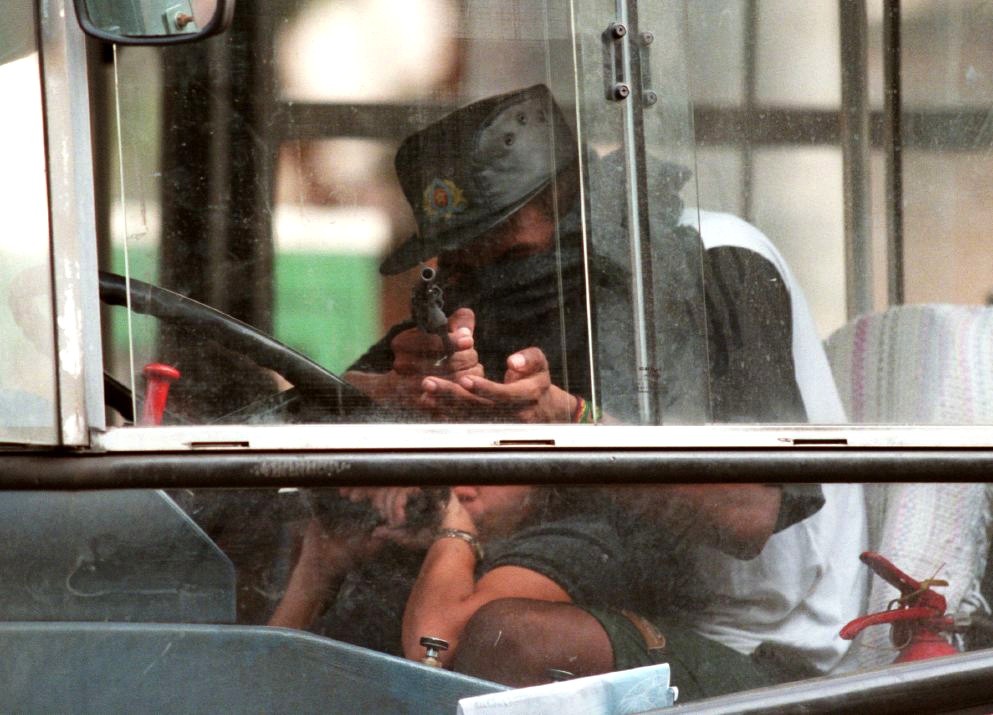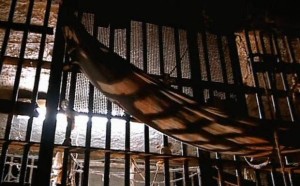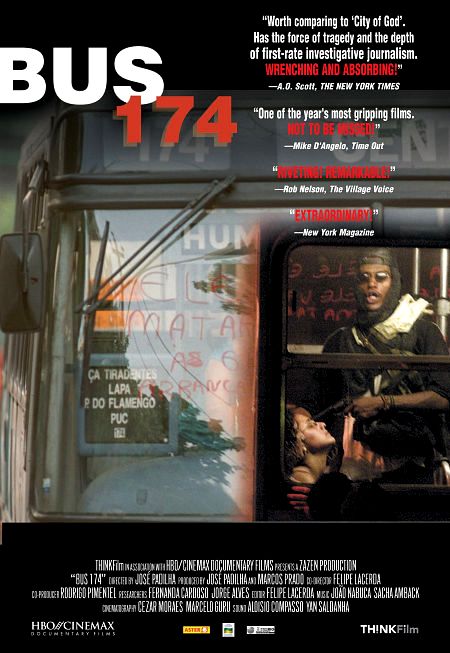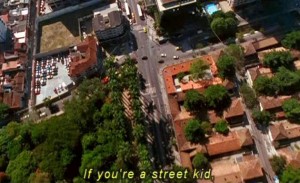
“They do it because we fail to deal with social exclusion, racism, and other kinds of stigmatization.” – Sociologist Luis Eduardo Soares
Disenfranchised, neglected, the forgotten. The documentary Bus 174 (2004) is a glimpse into a life so devalued, that of Sandro do Nascimento, that he jumped onto a bus in Rio de Janeiro with the intent to rob the occupants, eventually took the passengers hostage as the pressure escalated, and instigated a crisis that was filmed on television and ended in horror. The television cameras aggravated the inevitable tragedy. The fated 22-year old acted violently for the cameras. He wanted to put on a show, it made him feel powerful knowing the TV cameras were protecting him. “He had nothing to lose,” the hostages recalled.
We get plenty of appropriate volunteers in the police department, SWAT, social workers, homeless denizens, and jailers to comment in retrospect. I will not be coy about it however. Sociologist Luis Eduardo Soares is the best interviewee in the film. “There are two ways of producing social invisibility. One can be made invisible if his presence is neglected. And one can be made invisible if we cast a stigma over him, replacing his singularity with our prejudices,” Soares says, “We only see what we project, and not who they really are.”
From an early age, Sandro learned to hustle. He was a street urchin who witnessed boys and girls his age beaten by police, neglected by an unkind civil system that knocked down their progress, and tossed them away as outcasts. Sandro has a social worker, an aunt, and an adopted mother who speak on his behalf in the film. He would appear like a nut with a gun when we see the live footage of the TV news start the film. But according to his sympathizers, Sandro had optimistic dreams that would have been constructive to society, but opportunities failed him. Sandro was wrong to sniff glue and snort coke that would take him off course. And true, he was likely very high the day of the hostage crisis – an inevitable end to a short, hopeless life.
“The boy exchanges his future, his life, his soul, for an ephemeral and fiery moment of glory,” Eduardo explains, continuing, “The small glory of being acknowledged, valued, of praising his self-confidence.”
Sandro was probably a good kid at some point, hungry for recognition, but only had chance of good progress through six years old, until his mom was butchered in front of him. Subsequently he became a street kid to survive. And years later, he was handicapped by narrowed options.
 Police came, he knew he was doomed. He had been to jail before, which in Rio are not like our American jails but are instead abysmal dungeons. Thirty at a time locked into one cell, inmates toppling each other, sleeping on hard floors, rotten food and dirty water consumed, temperatures beyond 100-degree Fahrenheit (Yes, you get the visuals). No, Sandro was never going to go back there. What happened on Bus 174 is at once an inexorable tragedy and yet a fated gestation on social malfunction, and the hypocrisy of the higher social classes shunning the dwellers of the lower depths without extending graces to understand them.
Police came, he knew he was doomed. He had been to jail before, which in Rio are not like our American jails but are instead abysmal dungeons. Thirty at a time locked into one cell, inmates toppling each other, sleeping on hard floors, rotten food and dirty water consumed, temperatures beyond 100-degree Fahrenheit (Yes, you get the visuals). No, Sandro was never going to go back there. What happened on Bus 174 is at once an inexorable tragedy and yet a fated gestation on social malfunction, and the hypocrisy of the higher social classes shunning the dwellers of the lower depths without extending graces to understand them.
120 Minutes. Rated R.
Film Cousins: “Dog Day Afternoon” (1975); “Pixote” (1981, Brazil); “City of God” (2002, Brazil); “Sin Nombre” (2009, Mexico).







